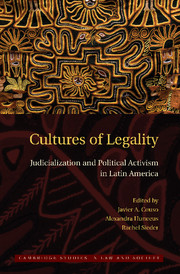Book contents
- Frontmatter
- Contents
- Contributors
- PART I INTRODUCTION
- PART II COURTS AND JUDICIALIZATION THROUGH A CULTURAL LENS
- PART III JUDICIALIZATION BEYOND THE COURTS
- 6 The Transformation of Constitutional Discourse and the Judicialization of Politics in Latin America
- 7 Legal Cultures in the (Un)Rule of Law: Indigenous Rights and Juridification in Guatemala
- 8 Political Activism and the Practice of Law in Venezuela
- 9 The Mapuche People's Battle for Indigenous Land: Litigation as a Strategy to Defend Indigenous Land Rights
- 10 Judicialization in Argentina: Legal Culture or Opportunities and Support Structures?
- 11 Novel Appropriations of the Law in the Pursuit of Political and Social Change in Latin America
- Index
- CAMBRIDGE STUDIES IN LAW AND SOCIETY
- References
9 - The Mapuche People's Battle for Indigenous Land: Litigation as a Strategy to Defend Indigenous Land Rights
Published online by Cambridge University Press: 20 May 2010
- Frontmatter
- Contents
- Contributors
- PART I INTRODUCTION
- PART II COURTS AND JUDICIALIZATION THROUGH A CULTURAL LENS
- PART III JUDICIALIZATION BEYOND THE COURTS
- 6 The Transformation of Constitutional Discourse and the Judicialization of Politics in Latin America
- 7 Legal Cultures in the (Un)Rule of Law: Indigenous Rights and Juridification in Guatemala
- 8 Political Activism and the Practice of Law in Venezuela
- 9 The Mapuche People's Battle for Indigenous Land: Litigation as a Strategy to Defend Indigenous Land Rights
- 10 Judicialization in Argentina: Legal Culture or Opportunities and Support Structures?
- 11 Novel Appropriations of the Law in the Pursuit of Political and Social Change in Latin America
- Index
- CAMBRIDGE STUDIES IN LAW AND SOCIETY
- References
Summary
INTRODUCTION
Land constitutes the basis for the livelihoods and cultures of indigenous peoples. They rely on access to their traditional lands and natural resources for their economic sustenance, as well as for the continued survival of their cultural and spiritual identity. The deprivation of their land has consequences for the economic well-being and the living conditions of the indigenous peoples (Stavenhagen 2002). Indigenous communities are often among the poorest and most marginalized groups of society. Studies on indigenous peoples and poverty in Latin America conclude that “poverty among Latin America's indigenous population is pervasive and severe [and] the living conditions of the indigenous people are generally abysmal, especially when compared to those of the non-indigenous population” (Stavenhagen 2002: 13, par. 35).
Rights to land and natural resources are thus fundamental to indigenous peoples, and protecting these rights remains one of the central issues for their organizations. Courts may constitute an arena for mobilizing around indigenous land rights and may play a role in improving respect for them. Thus, indigenous peoples of Latin America increasingly turn to the legal system for the defense of their rights (Sieder 2005: 1). The prospect of achieving significant results by means of litigation depends on the accessibility of the judicial system, but there are numerous obstacles that may prevent poor and marginalized people from accessing justice, and in Latin America, access to justice is in many cases restricted for these groups.
- Type
- Chapter
- Information
- Cultures of LegalityJudicialization and Political Activism in Latin America, pp. 207 - 233Publisher: Cambridge University PressPrint publication year: 2010
References
- 3
- Cited by



